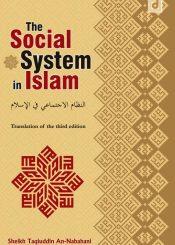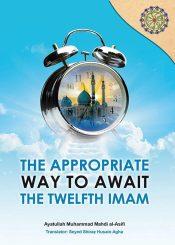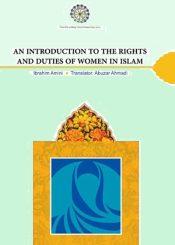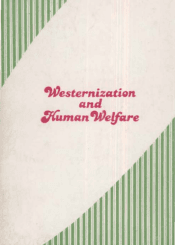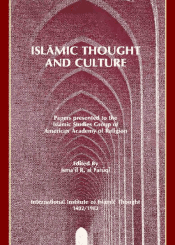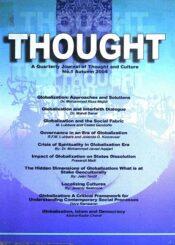Human Behavior and Its Organization
Human Behavior and Its Organization
0 Vote
400 View
Published by: Al-Balagh Foundation Introduction Praise be to Allah. Who created man and inspired him with knowledge and high ideals, and peace be upon Prophet Muhammad (s.a.w.) and his infallible Household and the righteous among his companions. Islam has taken great care to provide the human race with ideological and ethical values in order to preserve and pronounce self-dignity and at the same time to act as a safeguard against immoral inclinations. In light of the fact that human behavior has its negative and positive points, it is imperative to promote healthy conscience, so as to guide people towards decency and creativity. Hence, Islam has laid stress that an individual's behavior can have its impact in the wider sphere of social activity owing to the laws and logic of human interactions. Having realized the ideological and practical influence of Islamic education and learning, the enemies of mankind have left no stone unturned to prevent the implementation of divine laws in reconstructing Human Society, which as a result is sadly suffering today from chaos and disintegration. Despite the blessed emergence of Islamic rule in Iran which contributed much to the advantage of humanity, ardent and concerted efforts are required to counter the anti-Islamic campaign of promoting sin and immorality. Accordingly, Al-Balagh Foundation in its endeavors to hold aloft the torch of spiritual guidance presents this small effort Human Behavior and its Organization', to its dear readers whose enthusiasm has been a constant source of inspiration Al-Balagh Foundation What Is Behavior Behavior means the manner of conducting oneself and can be defined as anything said, done, decided or holding belief in. It includes the activities or responses of an individual or a group to the environment around. Human behavior, despite its disparity in mode and purpose, is indeed a series of closely related processes leading to a lifelike, fruitful and creative reality. Any action performed by us passes through several stages since its inception as a simple idea until it becomes an objective and effective fact in our external world of action, after having been generated and formulated in the soul. With regard to the vital importance attached to the types and goals of human actions on whom depends the ultimate destiny and prosperity of mankind, Islam has laid down well-defined rules and regulations to organize behavior for the benefit of the whole humanity at large. Consequently, Islam has indicated the factors that give rise to and define human actions as follows: 1. The Stimulus 2. The Aim 3. The Principles, Ideas and Social Values 4. The Intention Since each of these four factors exercise their influence in creating and defining human deeds and their effect on society, Islam has wonderfully outlined their proper role and practical ways of organizing, developing and expressing them. And by doing so it offers us a chance of living a harmonious and happier life, because life is merely a series of human actions reflecting our inner-disposition. Elements of Conduct 1. Stimulus: It is the power that creates in the soul the inclination towards any action good or bad. It is the force which arouses the innate feelings towards the attracting object. And, if left to its primitive course without proper guidance or reasoning it may quickly assume practical dimensions, irrespective of whether the deed done was good or bad. For instance woman' has been man's source for appeasing his sexual appetite, but on the other hand the very idea of punishment' for unlawful acts instills fear in him. Natural phenomena have also been a chief motivating factor, and in light of this fact, stimuli are definite signs of pointing out the existence of things and objects towards which man is inclined and shows concern for. Thus stimulus cannot play its decisive role in determining human action unless it considers the following points: 1. The incentive has to be transported through the organ of senses and perception like eyes, ears, nose and feelings which sometimes necessitate touching, tasting or smelling, and whose function is to collect living data. 2. The inner incitement comes into effect following the need for such things as food, drink, sex, precaution against loss or danger, liking for the blessings of life and a dislike for indecency which all result in reaction. 3. Determining voluntary action that one can freely choose to accept or reject, and delivering necessary orders either positive or negative to the organs involved in relation to the attracting object. In view of this scientific concept about the stimulus, Islam has firmly rejected the mechanical theory of human behavioral philosophy on the ideological and objective basis of reward and punishment'. This approach finds expression in the easy to perceive interrelationship between holding responsibility, recompense for human actions and the fact that Allah is altogether Just and free of blame for any mischief and oppression committed by mankind. In other words Islamic theory is in perfect agreement with the logic of interrelationship and the dictates of justice, and goes on to expose the absurdity of the mechanical thought of conduct which presupposes that mankind bears no responsibility for its actions. Consequently, Islam attaches great importance not only to the methods and programs of controlling and developing the stimulus but also to the motive itself. Because, Islam is perfectly aware of the fact that influence exercised by these elements together with the motive behind, ultimately decides the human attitude and contributes to one's happiness or sorrow, both in this world and the hereafter. Hence, to ensure correct behavior, Islam has taken the initiative to reform the social environment and has legislated laws and regulations to remove the temptations of such immoralities as wine, gambling, illicit affairs, debauchery, fraud, oppression, exploitation and other mediums of social disintegration. "Do not follow of which you have no knowledge, the hearing, the sight and the heart, all of these shall surely be questioned of Holy Qur’an (17:36) Having done its best to protect man from temptations and carnal desires, Islam has enacted laws to restrain and to organize human actions in such a way as to guarantee a healthy social atmosphere. It has devoted the majority of its ethical plans for establishing the good propensities of virtue and integrity and to eliminate the immoralities of corruption and dissipation which undermine the social infrastructure of the human race. After confirming the important function of the stimulus, Islam goes on to stress the indispensable role of will power in human life. It points out that only a decisive and rightly guided will-power firms up decisions and acts as a resistant against pitfalls, because mankind, gifted with the wondrous power of reason and intellect is certainly under no compulsion to respond to the pull of material forces. In this way the innate good and noble tendencies become conscious in a human being, enabling one to choose between virtue and vice. Only when one attains the ability to think and act according to one's determined will power, then that individual will be able to contribute to a beneficial, noble and decent life. Thus we are at liberty either to discern and resist temptation or to surrender to its deceptive lure, and in either case the responsibility rests entirely upon us. If the deed was virtuous one stands to benefit and perchance it was vicious one stands to lose. In view of this fact, Islam has dealt in detail with the idea of responsibility along with the principle of accountability and recompense. "And stop them, for they shall be questioned.” Holy Qur’an (37:24) Therefore, Islam has a perfect set of laws and regulations that help us lead a better and happier life based on faith, sincerity, love, respect, forgiveness and other common human values and interests, basking in the everlasting mercy of Allah. 2. The Aim: It means a clearly defined end towards which efforts are directed or which one holds as a goal to be reached through endeavor or strive. Every voluntary human action aims at achieving something that justifies its initiation without which it is rendered into a vain, purposeless and negative practice. How wonderfully the Holy Qur'an confirms the purposefulness and seriousness of each and every human action: "Every one has a direction to which he returns, therefore hasten to do good deeds.” Holy Qur’an (2:148) “Our Lord! You have not created this (universe) in vain! Glory be to You. Save us from the punishment of the fire.” Holy Qur’an (3:191) “We did not create the heaven and the earth and what is between them just for fun.” Holy Qur’an (2 1:16) "What! Did you then think that We had created you in vain and that you shall not be returned to Us?” Holy Qur’an (23:115) The above verses make it clear that the value of any action lies not in the action itself but in the aim behind. As a matter of fact aim and action are quite inseparable. Aim without action leads a person nowhere, and an aimless action makes the whole deed void and could even be detrimental to the doer. For instance, Prayer as also Fasting and Jihad, are performed not as mere ritual acts but rather as living meaningful practices that exercise a profound and positive effect on the society we live in and also entail divine reward and bliss. Thus the purpose behind any human action is specified by its perspective and outlook, for action reveals the conflicting trends and aspirations in human life. No wonder, the faithful have been striving to devote their endeavors to the one and only cherished and long-sought reward, that is winning Allah's Grace. “I have turned myself being upright to Him Who originated the heavens and the earth, and l am not one of the polytheists.” Holy Qur’an (6:80) “If they dispute with you, tell: I have submitted my face' (i.e. myself) entirely to Allah and those who follow me...” Holy Qur’an (3:19) “Who has a better religion than he who completely submits himself to Allah (Islam), being a good-doer...” Holy Qur’an (4:125) "Yes indeed! Whoever submits himself entirely to Allah and is a good-doer, he has his reward from his Lord.” Holy Qur’an (2. 112) "And those who are patient, seeking the pleasure of their Lord, and keep lip prayer and spend secretly and openly out of what we have given them and repel evil with good; those are they who shall have the ultimate abode,” Holy Qur’an (13:22,) "And bind yourself with those who call upon their Lord at morning and evening desiring His favor” Holy Qur’an (18:28) How beautifully, Islam guides humanity towards realizing the invaluable reward for actions done in this world and to this end it strives to fill the society with love, harmony and justice. 3. Principles, Ideas and Social Values: It is a well-established fact that ideas and social principles, prevalent at a certain time and place, continue to wield their influence long afterwards, in forming attitudes and behavior of coming generations. How beautifully the Holy Qur'an depicts the negative influence exercised by erroneous ideas, manners and customs of previous generations on posterity: “They said: Nay, we found our fathers doing so.” Holy Qur’an (26:74) "And thus, We did not send before you any warner in a town, but those who led easy lives in it said: Surely we found our fathers on a certain course, and surely we are followers of their footsteps. (The warner) said: What! Even if I bring to you a course more upright than that on which you found your fat hers? They said: Sure/v we are unbelievers in that with which YOU are sent.” Holy Qur’an (43: 23-24) Likewise, the Holy Book describes the effects of a good, healthy and progressive environment in molding the attitudes of later generations: "And (as for) those who believe and their offspring follow them in faith, We will unite with them their offspring and We will not diminish to them aught of their work; every man is responsible for what he shall have wrought. ” Holy Qur’an (52:21) "I have followed the religion of my fathers -Abraham, Isaac and Jacob. it is not for us to associate anything with Allah. This is indeed a grace of Allah upon us, and upon the people; but most of the people do not thank.” Holy Qur’an (12:38) By pinpointing these facts, it is the prime objective of Islamic laws and regulations to build human conduct and behavior on a virtuous and humane basis so that we can think, behave and decide correctly and decisively in the light of these heavenly teachings. Guided by this concept, mankind can avoid confusion and error and come to have a clear and wise judgment and outlook that will enable us to lead a fruitful and creative life. “Then We set you on the right way of religion, therefore follow it, and do not follow the low desires of those who do not know.” Holy Qur’an (45:18) Since this heavenly system is the only source of peace, tranquility and happiness manifesting Allah's All-merciful and All-compassionate Will, mankind has been commanded to live according to these divine laws and instructions. “Every one has a direction to which he turns, therefore hasten to do good deeds; wherever you are, Allah will bring you all together. Surely Allah has power over all things.” Holy Qur’an (2:148) “We made them Imams who guided (people) by Our command, and We revealed to them the doing of good....” Holy Qur’an (21:73) 4- The Intention: It can be defined as having something in mind as a plan. The first inner move towards an action for the purpose of initiating and executing it. This inner attitude comes into being when one first responds to it, then plans it. Islam considers ‘Intention' as the soul of action, the very essence with which action is identified, judged, rated and evaluated. Any action however good it may look, lacks sense and worth without a truthful and sincere intention, Prayer, for example, is not a mere ritual act but is the outer frame of a meaningful and worthy human effort which lifts up the spirit and has a rich philosophy behind it. It has a soothing effect on human character and fosters fraternity, provided purity of purpose is involved. Therefore, intention is an unmistakable criterion for assessing any deed since it reveals the true, inner world of a human and the motive behind the act done. Without sincere intention, several actions despite their seeming goodness, turn out to be false, insincere and conceited practices. And moreover, a toiling in vain has its own grave consequences for the doer owing to the bad intentions cherished. How vividly the Holy Qur'an paints the picture of vain efforts: "0 you who believe! Do not nullify your charity by reproach and injury, like the person who spends his wealth to show it to the people and does not believe in Allah and the last day. The parable of such a person is as the parable of a smooth rock with earth upon it then a heavy rain falls upon it leaving it bare; they shall not gain anything of what the)' have earned. Allah does not guide the unbelieving people. ” Holy Qur’an (2:264) It does not stop there and goes on to draw the bright picture of a purposeful deed with sincerity of intention behind: "And the parable of those who spend their wealth seeking the pleasure of Allah, and keeping firm their souls, is as the parable of a garden on an elevated ground, upon which heavy rain falls and thus it brings its fruit twofold; but if heavy rain does not fall upon it, then light rain. Allah sees what you do.” Holy Qur’an (2:265) The Holy Book's impressive comparison, on one hand portrays the enriching, rewarding and worthy effect of a selfless action overflowing with pristine intention behind it, while on the other hand, it depicts the vain fruitless result of a deed lacking purity of purpose. It projects the former as an exercise in futility and earth swept away by a rainfall, but likens the latter deed to pleasant rainfall resulting in richness, fertility and lush greenery of a garden in full blossom. Almighty Allah adds: (Would anyone of you wish to have a garden of palms and vines, with streams flowing beneath it, he has all kinds of fruits in it, he is of old age and has weak offspring. Then, lo! a whirlwind with fire smites his garden and it gets burnt up. Thus Allah makes the signs clear to you, that you may reflect.” Holy Qur’an (2:266) Prophet Muhammad (s.a.w.) explains the same as follows "Actions depend on intentions....” [1] "A believer's intention is better than his deed, but a disbeliever s intention is worse than his deed and everyone acts according to his intention.” [2] Imam Zain ul-Abideen (a.s.) says: "No deed (will be accepted) except for intention.” lmam Ja'far aI-Sadiq (a.s.) expounding the verse: “…so that He might try you, which one of you is best in deeds..” [Holy Qur’an (11:7)] Says: "It's not meant that he exerts more effort, but displays more wisdom and justice... This justice means fearing Allah and having purity of purpose, for when the action is wholly devoted to seek Allah’s favor, intention is better than the deed; virtually it is the deed itself” [3] Thus as has been discussed in brief intention' is the focal point around which action revolves and for the benefit of our dear readers we once again stress its importance by highlighting the following points: 1. 1. Intention is the manifestation of the inner-self. 2. 2. Actions are measured by their intentions. 3. 3. Acceptance and reward of any action depend entirely on the intention behind the deed. The Innate Stages for the Birth of an Action It is a scientific fact that the outer world of action, including all human activities, attitudes and customs, are nothing but a clear expression of the inner-disposition. In view of the above fact, Islam has made great efforts to build the spiritual world on humane, practical and rational foundations. It has systematically diagnosed and pinpointed all internal impulses that make our deeds null and void. Negative impulses such as imposture, blasphemy, polytheism, atheism, selfishness, oppression, fraud, pursuit of wanton pleasures, etc. are nothing but self-conceit which take the doer to an evil destination. "0 you who believe! Do not nullify your charity by reproach and injury, like the person who spends his wealth to show it to the people and does not believe in Allah and the last day. The parable of such a person is as the parable of a smooth rock with earth upon it, then, a heavy rain falls upon it leaving it bare. They shall not gain anything of what they have earned. Allah does not guide the unbelieving people. And the parable of those who spend their wealth seeking the pleasure of Allah, and keeping firm their souls, is as the parable of a garden on an elevated ground, upon which heavy rain falls and thus it brings forth its fruit twofold: but if heavy rain does not fall upon it, then light rain. Allah sees what you do. Would anyone of you wish to have a garden of paints and vines, with streams flowing beneath it, he has all kinds of fruit in it, he is of old age and has weak offspring. Then lo! a whirlwind with fire smiles his garden and it gets burnt up. Thus Allah makes the signs clear to you, that von mar reflect.” Holy Qur’an (2: 264-266) "And when you see them, their persons will please you, and if they speak, you will listen to their speech; (they are) as if they were big pieces of wood clad with garments; they think every cry to be against them. They are the enemy', therefore beware of them; may Allah destroy them, whence are they turned back?” Holy Qur’an (63:4) Thus Islam justifies the fact that actions like prayer, fasting, helping the needy and partaking in charitable deeds, are a manifestation of the genuine internal attitude conceived, formulated and embodied into a positive or negative behavior. Such conduct will not transform into action unless it has been preceded by the following prerequisites: 1. Full awareness of the action performed, its effects and outcome. 2. Inner stimulus - the positive reaction and the intention to do it. 3. Will to execute it, using all physical and mental powers. By the above criteria, Islam scientifically measures and evaluates actions without which several deeds however great they may appear, are merely a demonstration of false, deceptive impulses. Therefore, Islam does not ask for blind ignorant actions from its followers but lays emphasis on ration and perfect compatibility between the inner motive and the real purpose of the deed done. Aware of the social impact, Islam insists on a pure healthy atmosphere and firmly rejects the pretentious, beguiling and deceiving attitudes frowning upon them as ugly and blasphemous. "And nothing prevents that their spending should be accepted from them, but that they disbelieve in Allah and His Messenger, and they do not perform the prayer except that they are lazy, and they do not spend except that they are unwilling.” Holy Qur’an (9:54) In short, Islam as now clearly understood to our readers, is the only religion which is based on logic and insists that human actions should be based on free will and sincerity of purpose. Only a full awareness of the deed intended and its outcome, free of pretensions and deception could help mankind win the eternal Blessings and Grace of the Almighty. Praise be to Allah, Lord of the worlds. Endnotes 1. Jami aI-Sa'adat Mohhammad Mahdi AI-Naraqi. 2. Usul aI-Kafi. Bab aI-Niyyah. p. 84: Yaqub aI-Kulayni. 3. ibid. Source: al-shia.org
